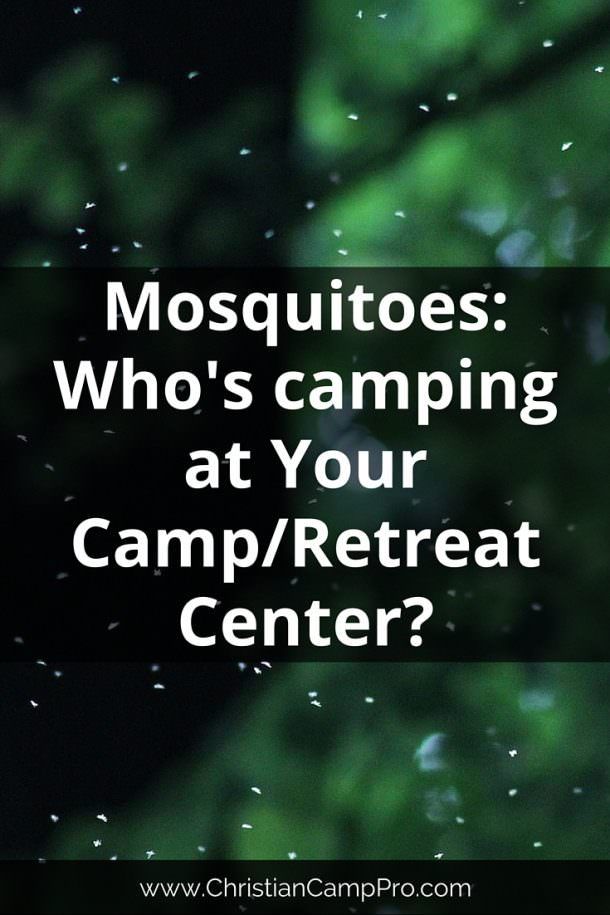Mosquitoes: Who's camping at Your Camp/Retreat Center?

When we first moved to Southeast Missouri in 1989, we saw no armadillos dead on the side of the road. We thought we left them all behind in Texas. Now, we see as many of them on the side of the roads (freeways included) as we did in Texas. Maybe even more.
They have migrated very aggressively.
True, it’s easier to spot a full grown armadillo than a full grown mosquito, but the mosquitoes that carry disease and cause illnesses are also aggressively on the move. They are in places today that they weren’t just a short time ago.
Folks, it’s Zika. But not just Zika, but also Malaria, Chikungunya, Dog Heartworm, Dengue, Yellow Fever, Eastern Equine Encephalitis, St. Louis Encephalitis, LaCrosse Encephalitis, Western Equine Encephalitis, West Nile Virus, and others PLUS also that one that makes the current news: the Zika Virus.
According to www.mosquito.org, “over one million people world wide die from mosquito borne disease every year.” That doesn’t include the animals such as horses and dogs, nor does it include the people who get sick but recover, nor those born with devastating birth defects.
So, the real question here is what can you do as a Christian Camp/Christian Retreat Center director to protect your campers, your staff, your family, and even yourself?
#1 – Have a Plan.
#2 – Work that Plan!
Consider the following: You have to be more aggressive than the mosquitoes are!
- Insist that everyone, staff and campers alike, work together. That puts more eyes on deck to see what someone else may have missed.
- Clean up any source of standing water.
- Locate all containers with standing water and drain them.
- Visually inspect from top to bottom anything from storm drains, outdoor faucets,water standing on roofs, clogged gutters that can pool water, plumbing vent/outlet pipes, septic systems, etc. Repair cracks, seal with caulking, clean out, and cover all opening with mesh wire (screening) that has holes smaller than adult mosquitoes.
- Don’t forget those trash receptacles. They may harbor way more than trash and those pesky-makes-the-kids-squeal tiny bees that buzz the sweet sodas.
- Educate your staff with meetings plus put up the posters you can download from www.cdc.gov/zika.
- Provide ample insect repellent for everyone. It should contain DEET. Educate how to use and how often to reapply.
- Work with your local mosquito control unit if there is one. Ask them to place mosquito traps inside your campgrounds and to inspect for areas that need attention. Trained eyes may see what untrained eyes don’t even know to look for. You really do need to know what exact types of the 3,000+ mosquitoes world wide have taken up resident on and around your premises. Only about 150 of those types live in the USA – and the good news, thankfully, is not all carry dangerous diseases. That being said, you need to know and take appropriate action for the types that call your camp home. Some bite mostly from dusk to dawn and “buzz.” The ones that carry Zika are stealth – they bite invisibly like on the back of your neck or arms or legs, silently, and in the day time.
- Check all screens, even in non-inhabited buildings. Fix or replace all that need it.
- You want to protect and actually INVITE our wonderful insect predators. Install bat houses and purple martin houses. You can easily find the plans for both online.
- Treat clothing and gear with an EPA approved product containing permethrin. Follow all directions and do not use on the skin. Include in the gear, shirts, pants, boots, caps, socks, tents, and mosquito netting. Sawyer Products SP649 Premium Permethrin Clothing Insect Repellent Trigger Spray, 12-Ounce (Spray Bottle Color May Vary)
- If your activities include outside camping, use approved mosquito netting to cover all sleeping quarters.
- Keep your grass and weeds cut short.
- Cover all open containers with the wire mesh.
- Cooperate with your local public health agency.
- Spray your encampment if indicated. Use what the local authorities recommend for your location. The mosquito eggs can remain dormant for thirty days (or more) and hatch out within a few days of being in standing water.
- This may be the most important of all: Ere on the side of cautious! You are protecting not only people, but the life of your entire facility. It takes just a few infected mosquitoes to produce a large outbreak of illness and panic!
Until next time, be blessed in the Name of Jesus in your camp/retreat center. I know I am!
Free Retreat Planning Checklist!
Over 20,000 Downloads! Join now to receive my FREE Retreat Planning Checklist that will save you time when planning your next event! You will also receive the latest games, themes, and ideas to help take your next camp or retreat to the next level. Don’t miss out!




